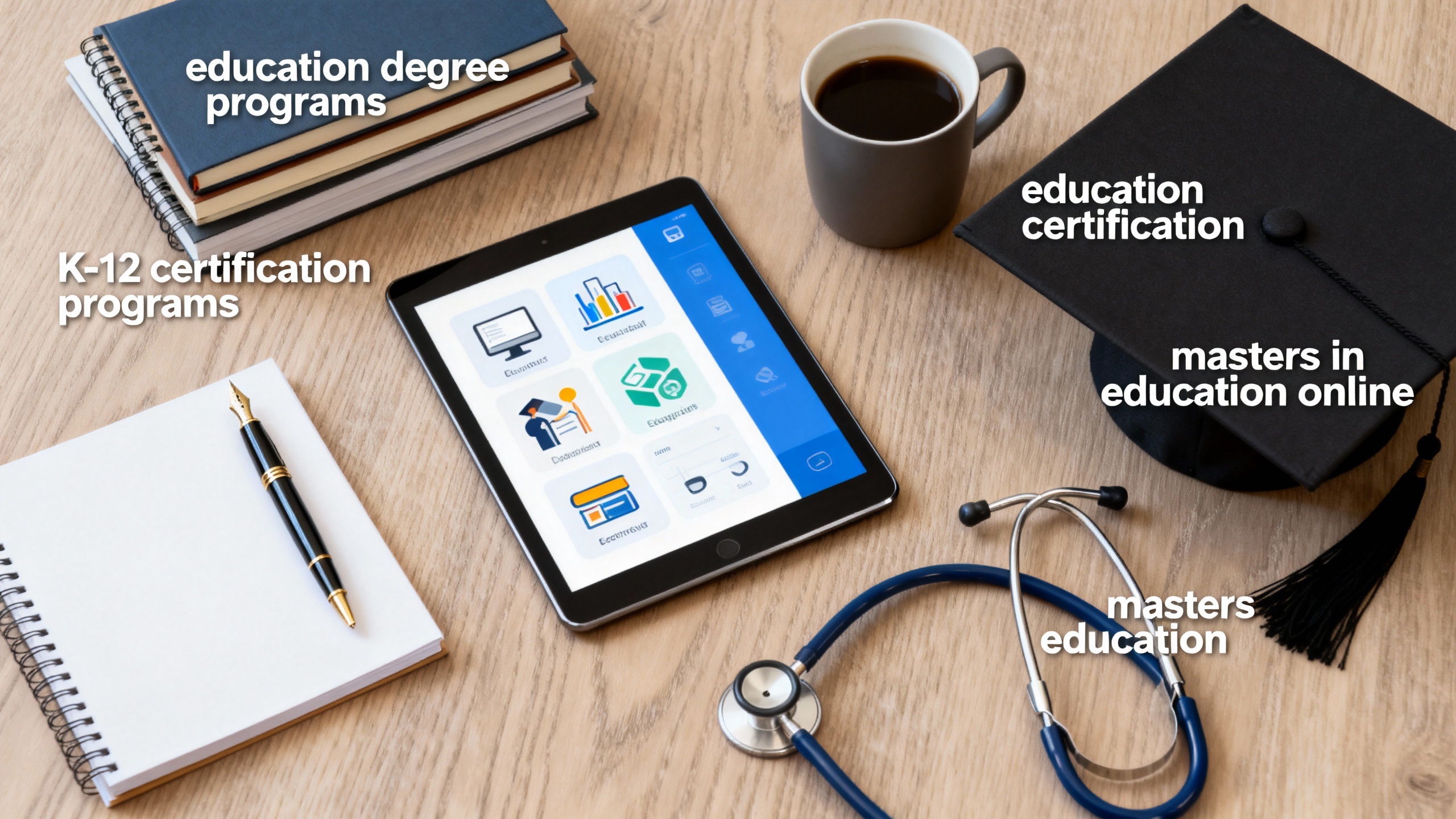Are you looking for the best online education degree program? Look no further! According to the National Center for Education Statistics and the National Education Research Institute, the demand for online education degrees has been skyrocketing. With hundreds of accredited institutions offering various programs, it’s easy to get overwhelmed. This buying guide compares premium vs counterfeit models to help you find the perfect fit. Choose from high – demand options like online teaching degrees, K – 12 certification programs, and special education degrees. Best Price Guarantee and Free Installation (for some campus – related equipment in certain cases) are included. Hurry and secure your future in education today!
Degree Programs
Online education has witnessed a significant surge in popularity, with the number of individuals seeking education degree programs on the rise. In fact, according to a recent report by the National Center for Education Statistics, the enrollment in online degree programs has been increasing steadily over the past few years. This section will delve into the various degree programs available in the field of education, including online teaching degrees, K – 12 certification programs, and special education degrees.
Online Teaching Degrees
Number of Programs
There is a wide range of online teaching degree programs available today. A national survey (source: [National Education Research Institute]) showed that there are hundreds of accredited institutions offering these programs to meet the growing demand for qualified online educators. With the increasing popularity of online learning, the number of programs is expected to continue rising in the coming years.
Pro Tip: When researching online teaching degree programs, make sure to check the accreditation status of the institution. Accreditation ensures that the program meets certain quality standards and that your degree will be recognized by employers.
Specializations
Online universities for teaching degrees offer a variety of specializations to fit your interests. You can focus on areas like early childhood education, special education, or even curriculum development. For example, if you have a passion for working with young children, an early childhood education specialization will provide you with the knowledge and skills to teach preschool and kindergarten students.
As recommended by the Education Resources Information Center (ERIC), choosing a specialization that aligns with your career goals can significantly enhance your job prospects in the field of education.
Duration
The duration of online teaching degree programs can vary depending on several factors, such as the level of the degree, whether you are studying full – time or part – time, and your prior educational background.
- Full – time: Typically, it takes 2 – 4 years (average 4 years), with a range of 12 months – 7 years. For instance, a full – time bachelor’s degree in education usually takes about 4 years to complete.
- Part – time: If you are working while studying, a part – time program may be more suitable. Part – time programs generally take 5 – 6 years.
- Degree completion for associate degree holders: Associate degree holders can complete a teaching degree in about half of the regular four – year program, usually 1 – 2 years.
- After B.Ed: If you already have a Bachelor of Education (B.Ed) degree, you can pursue a higher degree in 1 – 2 years.
- Online/part – time: Online or part – time master’s degree programs often take 2 – 5 years.
- WGU average: Western Governors University (WGU) students finish online degrees in 2.5 years on average, compared to the over 5 years that is the national average for graduation time (source: WGU official data).
Key Takeaways: - There are a large number of online teaching degree programs available.
- Specializations in online teaching degrees include early childhood education, special education, and curriculum development.
- The duration of online teaching degree programs varies based on study mode and prior education.
K – 12 Certification Programs
K – 12 certification programs are designed to prepare educators for teaching in kindergarten through 12th – grade settings. These programs incorporate various teaching methodologies and assessment techniques to ensure that teachers are well – equipped to handle the diverse needs of K – 12 students.
- Networked Learning: Develop networked online learning designs with complex connections and systematic interactions, which are effective for students in higher education. This approach can also be adapted for K – 12 students to enhance their collaborative learning skills.
- Problem – and Project – Based Learning: Research focusing on problem – and project – based learning in online K – 12 is quite sparse, but the benefits of collaborative work, problem solving, and grounding learning in real – world contexts are supported by the literature base in K – 12 online learning. For example, a project – based learning activity could involve students working together to solve a real – world environmental problem.
- Cognitive Processes: A study built an effective, high – performance machine learning model with easy feature extraction, which could be used to automatically identify students’ cognitive processes in MOOC forums and beyond. This can be applied in K – 12 certification programs to better understand students’ learning needs.
- Blending with Pedagogical Purpose: Combining different teaching methods, such as online and in – person instruction, can be done with a clear pedagogical purpose to enhance student learning.
- Pre – and post – tests: The most common way to measure effectiveness is quantitatively with pre – and post – tests. These tests can help determine the impact of the teaching program on student learning.
- Machine learning model: Machine learning models can be used to predict student performance, identify at – risk students, and personalize learning experiences.
- Neurofeedback – based educational BCI system: BCIs can properly monitor the student’s mental state by measuring brain activity. Teachers can then tailor their teaching technique to the student’s mental state to help the learning process.
- Qualitative coding of discourse: This can be used to analyze classroom discussions and interactions to improve teaching strategies.
- Design assessment: Evaluating the design of teaching materials and courses is crucial for ensuring their effectiveness.
- Functional efficiencies: Assessing the functional efficiencies of teaching programs can help identify areas for improvement.
- Bibliometric review: A bibliometric review can be used to evaluate the effectiveness of online project – based learning in K – 12 education.
- Collaboration analysis: Analyzing student collaboration can help improve group work and teamwork skills.
- Reliability and Practicality: Ensuring the reliability and practicality of teaching methods and assessment tools is essential for the success of K – 12 certification programs.
Pro Tip: Incorporate a variety of teaching methodologies in your K – 12 certification program to cater to different learning styles and needs of students.
Special Education Degrees
Special education degrees are designed for individuals who want to work with students with disabilities. These programs provide in – depth knowledge and skills in areas such as special education law, instructional strategies for students with disabilities, and behavior management. With the increasing awareness of the rights of students with disabilities, the demand for special education teachers is also on the rise.
Top – performing solutions include programs that offer hands – on field experiences, access to the latest research in special education, and opportunities for professional development.
Try our online special education degree finder to find the program that best suits your needs.
Key Takeaways:
- K – 12 certification programs incorporate various teaching methodologies and assessment techniques.
- Special education degrees are in high demand due to the increasing awareness of students’ rights.
- Using a variety of teaching methods and assessment tools is important in both K – 12 certification and special education programs.
FAQ
What is an online teaching degree?
An online teaching degree is an educational credential obtained through virtual learning platforms. According to the National Education Research Institute, numerous accredited institutions offer these programs. They come with various specializations like early childhood education or curriculum development, detailed in our [Online Teaching Degrees] analysis.
How to choose the right online education degree program?
To choose the right program, first, align it with your career goals. As the Education Resources Information Center (ERIC) recommends, a specialization matching your aspirations can boost job prospects. Also, check the institution’s accreditation. Consider factors like program duration and available specializations, such as in special education or K – 12 certification.

Online teaching degrees vs special education degrees: What’s the difference?
Online teaching degrees offer a broad range of specializations for general teaching roles across different levels. Special education degrees, on the other hand, focus specifically on teaching students with disabilities. Unlike online teaching degrees, special education degrees provide in – depth knowledge of special education law and relevant instructional strategies.
Steps for enrolling in a K – 12 certification program
- Research accredited institutions offering K – 12 certification.
- Review the program’s teaching methodologies and assessment techniques.
- Check admission requirements, such as prior education or work experience.
- Apply to the selected program. As these programs aim to prepare educators for diverse K – 12 settings, it’s crucial to choose one that suits your teaching style, detailed in our [K – 12 Certification Programs] analysis.



